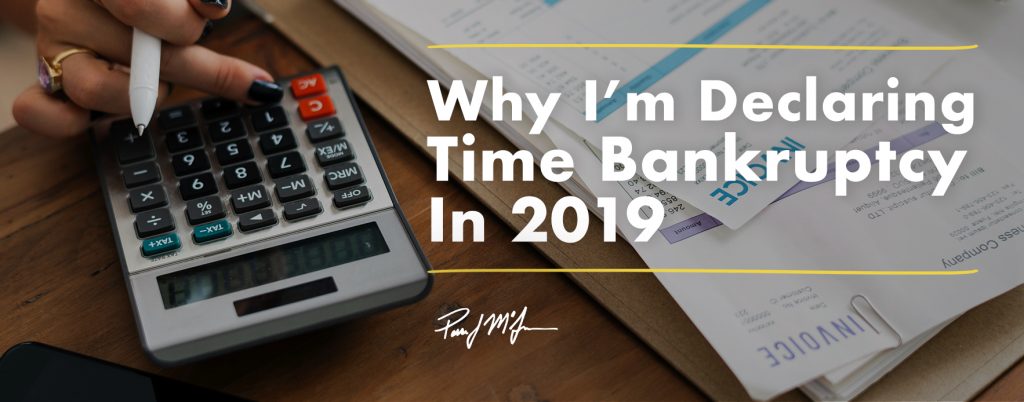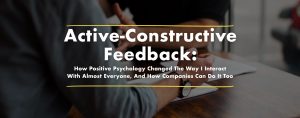And How I Plan to Emerge Temporally Solvent
Each year for years, I’ve tried to come up with a term that has defined that year for me. In 2014, the word was “cozy.” In 2015, it was “curated.” In 2016, it was “post-traumatic growth.” In 2017, I was too busy. (Hey, nobody’s perfect.) Before you say anything, I’m aware that these words live in the general zeitgeist and that I didn’t make them trendy- I’m the father of FOMO and FOBO, but I’m not Shakespeare, or whoever counts as his modern equivalent. The point is, whenever the calendar turns from one year to the next, I find a defining theme for that moment, and try to give it a name.
This year on December 31, I’m declaring myself “time bankrupt” and going into chapter 11- restructuring my time debt and renegotiating my commitments to reemerge in 2019 wholly restructured and once again temporally solvent. (While I’m not committing to “temporally solvent” as my term for 2019- I reserve the right!)
Of course, the concept of being “time poor” isn’t just a 2019 thing- though it’s a concept lots of people have been talking about in the post-recession 21st century, it’s a problem that has definitely been getting worse, not better. At this point, plenty of my contemporaries have been teetering on the brink of time bankruptcy for a while now. Most people I know have thrown their hands up in the air and decided that this is simply the shape of their life until (if) they retire. They are destined to a life where they have no control over their schedules, no unstructured time, and no flexibility - forever. Even large companies that have built profitable models by leveraging the “always on” workforce are beginning to realize that people are becoming burned out, brain dead, and unwell.
The concept of being time-poor, and its logical conclusion of time bankruptcy, is often touted as a problem of the high-powered startup, Silicon Valley, C-level exec type. It’s seen as an “upper-class problem.” Let me state emphatically that time bankruptcy is a classless problem- its cause is, for better or worse, the increased connectedness available to a large percentage of people, no matter where they live. Think about the last time you were bored - it was probably the day before you got your first smartphone. Since then, you have always had an unlimited source of distraction and entertainment. Over the years, you’ve used your phone to undertake an unlimited supply of tasks, to read thousands of news stories or to listen to hundreds of podcast episodes. You’ve filled every waking minute with stuff. Stuff that doesn’t make you happy, but rather less happy and less productive.
...even large companies that have built profitable models by leveraging the “always on” workforce are beginning to realize that people are becoming burned out, brain dead, and unwell.

I began to really think about my time bankruptcy last July while I was in Lalibela, Ethiopia. In the 1980s, the region around Lalibela was ground zero for the horrifying famine that crippled the country. Today, it’s a beautiful tourist destination best known for its UNESCO-recognized ancient churches and for the stunning pastoral landscape surrounding it. It’s a gorgeous, peaceful place.
While I was in Lalibela, my guide asked me what kind of work I was in, and I found it a little difficult to explain. Eventually, I came around to explaining that I wrote and talked about FOMO. “What’s FOMO?” he asked. I’ve had plenty of practice explaining FOMO to people, but I was at a loss in Lalibela. it was almost meaningless to my guide- he simply couldn’t conceive of such a thing existing in his life.

While I was there, I discovered pretty quickly that my Internet connectivity was spotty at best. After several frustrating attempts at getting work done remotely, I finally just gave up- and, as you’ve probably already predicted, immediately began to have a much better time. My friend Giles Foden, who wrote my favorite book, “The Last King of Scotland,” recommended another of his works, “Mimi and Toutou Go Forth: The Bizarre Battle Of Lake Tanganyika,” and I read it cover to cover (you should too, it’s fantastic!). Although I was in Lalibela for less than two days, time stopped and I savored the break from normal life. I was present, undistracted, very happy to put away my phone for hours. Of course, by the time I got back to Addis Ababa for the next week of work, I was once again glued to my phone and went right back into “fill my time” mode.
When I first quit my career in Corporate America to devote myself to starting my own company, investing, and speaking and writing about FOMO, FOBO, and 10% Entrepreneurship, I encountered something is common to many entrepreneurs that have walked away from a “traditional” career. The way most people spend their days is not of their choosing - it is defined by their employer. That was the case with me when I was working on Wall Street. When I started working for myself, I was suddenly free and had very little structure in my schedule. Some days I had very little to do at all. Rather than feeling happy that I could do whatever I wanted, I felt stressed. Having free time made me feel like a failure. Let me be clear- there wasn’t something else I was “supposed to” be doing, and I wasn’t neglecting anything I’d committed to. I simply wasn’t busy, and my mind and body didn’t know how to be okay with that. I was programmed to equate busyness with success. Think about it - the word business and “busyness” are basically one and the same.
As I struggled with how to deal with my lack of busyness (and to be honest, business) as I launched my new career, I tried to fill some of my “surplus” of free time by taking yoga- like a typical overachiever, I wanted to be the best at yoga, so I started going 5 or more times a week. When I was asked to choose a mantra, I decided that the thing I needed the most was “momentum, momentum, momentum.” Years later, now that I’m time bankrupt, it’s “calm, calm, calm.” Of course, now that I’m time bankrupt, I don’t have much time for yoga anymore. That fact makes me feel decidedly un-namaste.
So I’m declaring time bankruptcy and maybe you should too. But just as you shouldn’t declare bankruptcy without a plan, time bankruptcy is no different. So here’s my plan. And please believe me when I tell you that I hate New Year’s resolutions. I’ve rarely made them, when I have I’ve failed, and I think they are largely doomed to failure for most people. Instead, I’m choosing to find ways to restructure my time so that more of it is spent taking care of myself, doing things that are healthy and fulfilling, and give me more time to do what really matters- even if what really matters is doing nothing once in a while. These are goals. I’m making them public because - why not! Doing so will keep me honest and may also inspire you to do the same.
- I’m going to train for, and run in, the NYC half marathon. Exercise has tons of benefits, but preparing for a concrete goal like this forces me to be good to myself- and requires a fixed commitment to my training that will prevent me from having a void that I’ll fill with content. It will inject rigor into my schedule, and motivate me to value the other time I have around this immovable commitment. I’ll absolutely be reporting in over the year about my progress and experiences.
- I’m going to meditate 10 minutes a day. This doesn’t sound ambitious, but that’s not the point- it’s an attainable thing that’s good for me and it’s something I know has value. In a recent interview for FOMO Sapiens, Dina Kaplan, the CEO of the Path and a prolific meditation teacher told me that meditating for at least 9 minutes a day for a few months is sufficient to create positive changes in the brain. She makes a strong case for meditating, so here I go. Next year, I’m going to find a time in my day when I think the benefits will be most valuable, and block out 10 minutes for this and nothing else.
- I’ll explore ways to stop addictively reading news. There’s nothing wrong with reading or caring about the news- but if I’m being truly honest with myself, my viewing habits have nothing to do with a real need to be informed and more to do with a bad case of News FOMO. I stuff myself on a daily diet of Politico, Political Wire, and Axios, and check these sites about 50 times a day (no exaggeration). I’d say it adds up to at least an hour a day (smh). I don’t feel good about wasting this much time on a habit and let’s face it, it’s not healthy at all. The news these days is stress-inducing and there’s very little I can do to change the headlines. It’s an addiction and I want to kick it: my plans are to ditch the apps on my mobile phone, stop checking these mobile sites, and only view on them my desktop to limit my access. That’s step 1, but I’m sure I’ll need more ideas. Help! I invite your suggestions.
Do you need to declare time bankruptcy in 2019? It’s nothing to be ashamed of. Just like making a financial budget, every once in a while, you need to take stock of where all your time is going, how many different places you’re spending it, and where you can find savings. Renegotiate where your time is going, and just as with money, remember to set some resources aside for a rainy day: life offers a lot of great opportunities to explore, learn, and experience- but you’ll never be able to take advantage of them if you’re broke!




